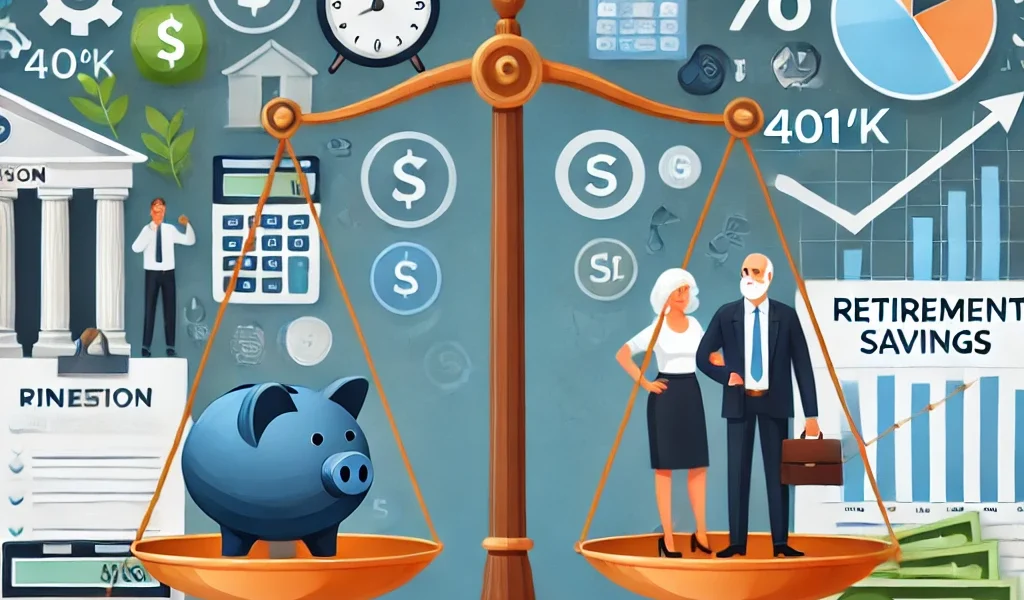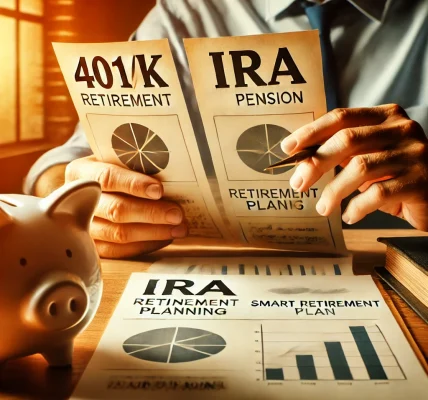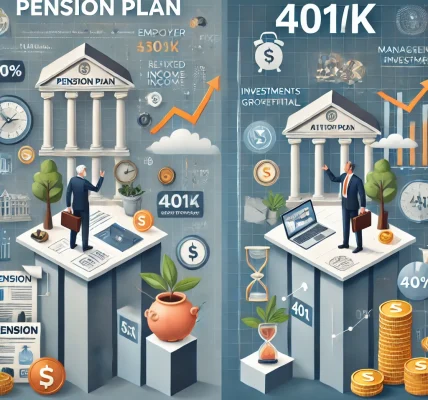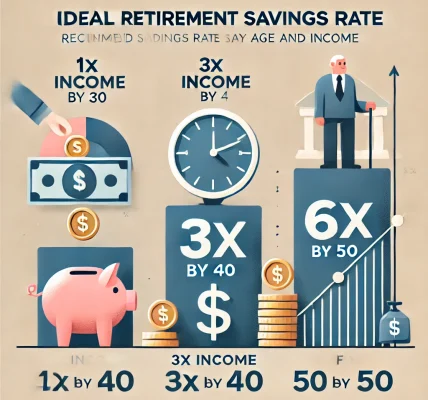Introduction
Planning for retirement is one of the most critical financial decisions you will make. Two of the most common retirement plans are pensions and 401(k) plans. Both offer financial security, but they work differently and come with unique advantages and disadvantages. Choosing between the two depends on factors such as job stability, employer offerings, personal financial goals, and risk tolerance.
In this guide, we will explore the key differences, benefits, and drawbacks of pensions and 401(k) plans to help you decide which is the right fit for your retirement needs.
Understanding Pension Plans
A pension plan, also known as a defined benefit plan, is a retirement plan in which an employer commits to providing you with a fixed monthly income after retirement. The amount you receive is typically based on:
- Your salary history
- Your years of service
- A predetermined pension formula
How Pension Plans Work
- Employer Contribution: Your employer contributes funds into a pension fund, which is managed by investment professionals.
- Vesting Period: You must work for the employer for a certain number of years (vesting period) to qualify for pension benefits.
- Guaranteed Payout: Once you retire, you receive a fixed amount either as monthly payments or a lump sum, depending on the plan’s rules.
Advantages of Pension Plans
✔ Guaranteed Income for Life: Provides financial stability as you receive a predictable monthly income.
✔ No Investment Risk for Employees: The employer manages the investments, meaning you don’t bear the market risk.
✔ Spousal Benefits: Many pension plans offer survivor benefits, ensuring your spouse receives payments if you pass away.
Disadvantages of Pension Plans
✖ Limited Availability: Many private companies no longer offer pensions, and they are mostly available to government employees and union workers.
✖ Lack of Control: Employees have little control over how pension funds are invested.
✖ Vesting Requirement: You may need to work for the company for several years before becoming eligible for benefits.
Understanding 401(k) Plans
A 401(k) plan is a defined contribution plan where employees contribute a portion of their salary to an investment account. Employers may also match a percentage of employee contributions. The money grows tax-deferred until retirement.
How 401(k) Plans Work
- Employee Contributions: You decide how much of your salary to contribute (subject to IRS limits).
- Employer Matching: Many employers match a portion of your contributions, essentially offering free money.
- Investment Growth: Your contributions are invested in stocks, bonds, and mutual funds, allowing your money to grow over time.
- Withdrawals in Retirement: You can begin withdrawing funds at age 59½ (with tax implications).
Advantages of 401(k) Plans
✔ Control Over Investments: You can choose how your money is invested based on risk tolerance.
✔ Employer Matching Contributions: Many companies offer matching funds, which can significantly boost your savings.
✔ Portability: You can transfer your 401(k) savings if you change jobs.
Disadvantages of 401(k) Plans
✖ Market Risk: Your retirement savings depend on investment performance, which can fluctuate.
✖ No Guaranteed Income: Unlike pensions, you must carefully manage withdrawals to ensure you don’t outlive your savings.
✖ Early Withdrawal Penalties: If you withdraw before age 59½, you may face taxes and penalties.
Key Differences Between Pension Plans and 401(k) Plans
| Feature | Pension Plan | 401(k) Plan |
|---|---|---|
| Type | Defined Benefit | Defined Contribution |
| Who Contributes? | Employer | Employee (with possible employer match) |
| Investment Management | Employer | Employee |
| Income Guarantee | Yes, fixed payments for life | No, depends on account balance |
| Market Risk | No risk for employees | Employees bear market risk |
| Portability | No, typically tied to employer | Yes, can be rolled over |
| Early Withdrawal Penalty | Not applicable | Yes, if withdrawn before age 59½ |
| Vesting Period | Typically required | Some employer contributions require vesting |
Which Plan Is Right for You?
Choosing between a pension plan and a 401(k) plan depends on several factors:
A Pension Plan Might Be Better If:
✔ You want a guaranteed income for life.
✔ You plan to stay with one employer for a long time.
✔ You prefer no investment risk.
A 401(k) Plan Might Be Better If:
✔ You want investment control and higher growth potential.
✔ You may switch jobs throughout your career.
✔ You can contribute aggressively and take advantage of employer matching.
What If You Have Both?
Some employers offer both pension and 401(k) plans. If you have access to both, it is wise to maximize your 401(k) contributions while also benefiting from the security of a pension.
Conclusion: Making the Right Choice
Both pension plans and 401(k) plans have unique advantages. Pensions offer security and stability, while 401(k) plans provide flexibility and growth potential.
If your employer provides a pension, it is a valuable benefit that offers a guaranteed retirement income. However, if you have access to a 401(k) plan, you should take full advantage of it by contributing as much as possible—especially if your employer offers matching contributions.
Ultimately, the best retirement plan depends on your financial goals, job stability, and risk tolerance. Understanding how each plan works will help you make informed decisions and build a financially secure retirement.
Frequently Asked Questions (FAQs)
1. Can I have both a pension and a 401(k)?
Yes, some employers offer both options. If you have both, it’s wise to contribute to your 401(k) plan while also taking advantage of your pension.
2. What happens if my employer ends the pension plan?
If your employer discontinues the pension plan, your benefits may be frozen, meaning you won’t accrue additional benefits, but you will still receive the amount earned.
3. Can I cash out my pension early?
Some pension plans allow early lump-sum withdrawals, but they often come with tax consequences.
4. How much should I contribute to my 401(k)?
Experts recommend contributing at least enough to get the full employer match and increasing contributions as your income grows.
5. Are 401(k) withdrawals taxable?
Yes, withdrawals from a traditional 401(k) are subject to income tax. However, Roth 401(k) withdrawals are tax-free if requirements are met.




